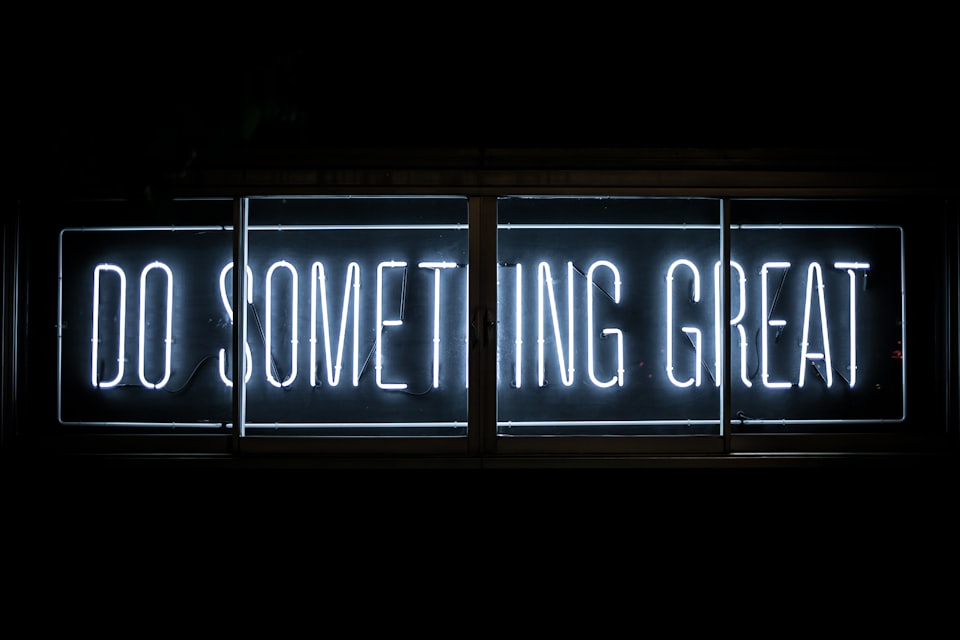How Do You Change Your Life? Start by Playing Like a Kid
Why picking up your innate "playing" skills is the key to making changes in your life, especially if you are an entrepreneur.

2024 has been passing fast.
In 2023, I was still busy with my business school application, writing essays and preparing for interviews, but that part of my life is now behind me. Since then I entered the field of solopreneurship by reading the book Doing Content Right by Steph Smith, a field entirely new to me. It's been a process, and I want to share my learnings along the way.
The importance of having clear directions, not goals
Having clear goals is important. With it you will be able to move in a focused direction with your limited resources. Lots of people have stressed the importance of having and setting clear goals.
If you don't know where you want to go, you are not going to get there.
Having said that, sometimes it is okay not knowing where you want to go, especially at the beginning of your journey.
Goal-setting itself could be ambiguous. If you think about it, are you making your goal for the long-term, mid-term, or short-term? These goals could be drastically different, sometimes even in conflict. If you drill further down you could go to the place of the meaning of life. Even one step shallower, the meaning of the cause you want to dedicate your life for. You can get paralyzed just by thinking about how to set your goals.
Goals are important. However, don't let your goal setting stop you from taking actions.
I'd argue that goals are overrated. Instead, having a clear direction is enough. For example, my direction is moving toward having freedom, and achieving financial freedom is the first step. Anything I do will be judged against 1) freedom and 2) financial freedom, and if it's in direct conflict with any of them, I will move away from it.
You should be clear about where you want to end up in five years, and it's okay to be ambiguous with where you want to be next year.
Trade your goal setting with system building
Your goals actually change over time, so it's not the end of the world if you don't know exactly what you want to accomplish, especially in the beginning. For example, I could have set a clear goal of achieving 5,000 subscribers and making my first 1,000 dollars by mid-2024, but I know that might intimidate me from taking actions. In the beginning, I know very little about newsletter, blogging, SEO, hosting, and everything that's a little bit technical. The learning curve is simply too deep. Besides, as a perfectionist I could fall into the old trap of trying to learn everything first before taking any action, which in return would be detrimental to the whole learning process.
“I don’t believe in specific goals. Scott Adams famously said, “Set up systems, not goals.” Use your judgment to figure out what kinds of environments you can thrive in, and then create an environment around you so you’re statistically likely to succeed.”
System building, while sounding complex and enterprise, actually can mean very simple things. For example, at its minimal it just means writing down the three things you do first thing in the morning. You wake up, grab some coffee, and check your emails. That's it. The second day, you repeat the same process. Then the day after. That's your morning system.
The beauty of a system-building mindset is that you can slowly optimize on your system, step by step. For example, if you are a morning person and find yourself at your peak creativity in the morning, you soon will realize that you'd be better off dropping the email-checking routine in your system and replace it with a 90-minute coding/writing/anything, etc. You do this automatically because you know exactly where you want to end up five years from now, even though your immediate goal for the day is unclear. As you move foward your goal will surface almost automatically.
But before you get to the system building phase, give yourself permission to "just play"
All human beings were born with the skill to explore and play. When we were kids, we all had this innate curiosity to try things out and ask questions. This was evident in my children who are asking questions and poking around the apartment ALL THE TIME (I try not to lose it).
Why is it important to "just play"? Well as adults our lives are very much organized around our work. You've already created your "system", aka. your routines. Doing anything outside of your existing routine will take conscious energy, and it doesn't feel good.
You feel like a child again.
I actually only come to realize this while writing this post. A child doesn't have any skill other than the God-given crying, eating, drinking, etc. As she grows up, she will encounter numerous first occasions. Sometimes she gets frustrated, crying for your attention or throwing things all over the place; other times she solves it by sheer curiosity and intuition, or the ability to play. Playing is actually a low-cost way for children to figure out this complex world.
As adults, we no longer have our parents attending to our emotions, and because we want to avoid the frustration and all the negative emotions, we gradually lose the ability to play. This can be very harmful to entrepreneurs, who encounter new problems, concepts, and information all the time.
Why is "playing" important?
At the beginning of anything new, you will not be able to know all the required elements of all the different pieces involved. For me while trying to build an online business, I didn't know what I was facing. I have a habit of getting in this perpetual learning stage and all I do by then will be reading books and watching videos, and I didn't want to repeat this mistake.
Understanding that it's important to first build the habit of creating stuff online, I've decided to follow this mindset of just playing with it, even though I wasn't sure about what to accomplish. Rest assured, I know my final destination, which is to build an online business that will help me achieve freedom eventually.
My goal, at this point, was to just get a sense of the different pieces involved in creating an online presence.
I followed the steps illustrated in the Doing Content Right book and first invested in a domain name. Without spending too much time on it, I simply picked my own name - Michael Shoe - and used it. Then it was Ghost, Google Analytics, etc., as well as a bunch of other platforms.
None of these was easy for me at the time. My strength is in understanding and learning about concepts, i.e. structures about a new industry, concepts on why somethings happens, etc. I'm quite slow, on the other hand, on learning tools, or any skill-based information.
However, it turns out that playing around is learning on steroids. I could have easily dwelled in Youtube watching about Google Analytics for hours before even typing it in my browser. That, looking back, would have been much slower. Playing is exploring disguised under the cover of adulthood so you don't stop in the face of uncertainty and ambiguity.
The next steps
To be honest I haven't had much success in my online initiative. I have yet gained any new subscriber since I've started, and made zero dollars. However, I'm no longer afraid of the technical aspects of things and are much more willing to explore. The biggest job for me right now is to find my niche that resonates with 1,000 people.



